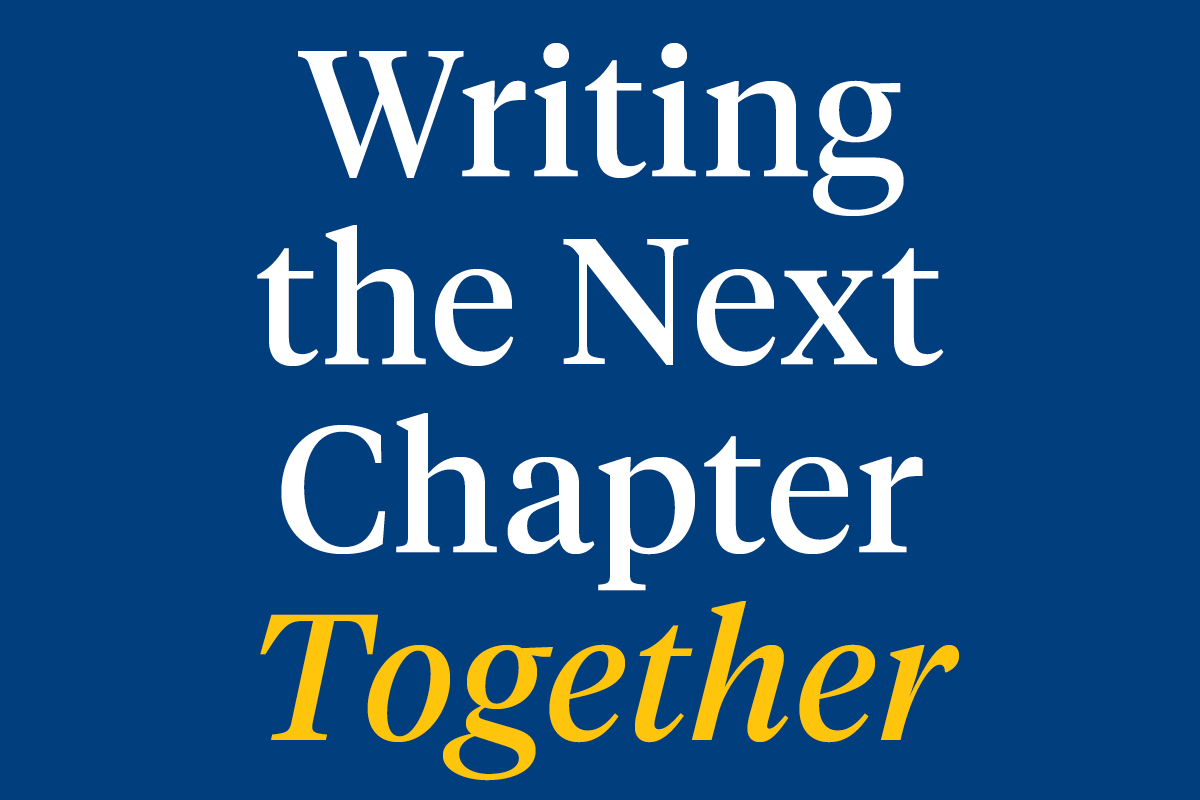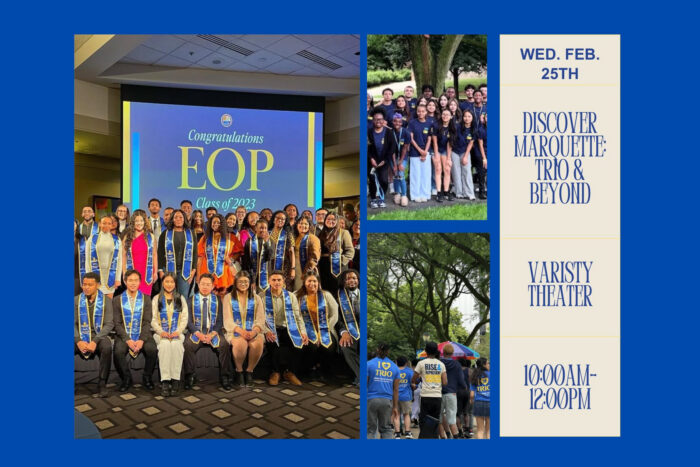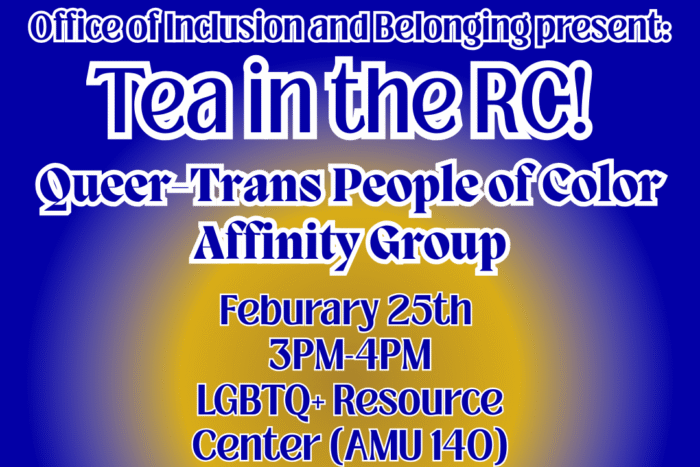Marquette was experiencing a time of special opportunities, unique in its history. But was it ready to capitalize on them?
That was the question lingering in discussions of the university’s future in the mid-2010s. In those days, Marquette had a new strategic plan that aimed for it to become one of the most innovative and accomplished Jesuit universities in the world. It had a new campus master plan providing a road map for the physical evolution of campus integrating academics, research and the student experience. And perhaps most importantly, at the time it had a new president, Dr. Michael R. Lovell, with the vision and leadership abilities to engage partners in filling in the details of these plans in inspired ways.
Marquette would require support — a lot of it — to realize all this potential. This is where the questions came in. The comprehensive philanthropic campaign the university was embarking on aimed to raise $750 million, more than twice as much as its previous record-setting campaign, which had wrapped up a full decade earlier. “This was a bold target, especially for a university that hadn’t been in a campaign for 10 years,”says Tim McMahon, vice president for university advancement, who joined Marquette in 2018 when this campaign, Time to Rise: The Marquette Promise to Be The Difference, was two years underway and still needed to find a higher gear. “This was going to be a great experiment and a great opportunity.”
Eight years after the campaign began, those nagging questions have been banished. When Time to Rise wrapped up this summer, it had surpassed its ambitious goal by $50 million.
The $801 million raised represents a response of unprecedented generosity from the Marquette community, including broad and deep elements of its donor base. Time to Rise soared by engaging and inspiring an impressive 71,000 donors, 38,000 of whom had never given to Marquette before. It succeeded through a surge in giving by alumni under 40 — and a 72 percent increase in donors giving $1 million or more for the first time, to help the campaign reach 150 donors at that level. To achieve this success, the campaign became what it needed to be ,says McMahon — “a campaign for everyone.”
Before his death from cancer just a few weeks before the completion of Time to Rise in June, President Lovell was heartened by the Marquette community’s enthusiastic embrace of the campaign he did so much to champion, recognizing it as “a philanthropic awakening.” Lovell saw that awakening proving to be transformative, supporting Marquette in pursuit of its Catholic, Jesuit educational mission, as seen in the examples found in the following four pages and elsewhere in this issue.
Furthering its central commitment to expand and enrich student opportunities, Time to Rise is generating a historic sum for student scholarships, $313 million. It is making possible a campus transformation that includes new homes for the colleges of Business Administration and Nursing and renovation of St. Joan of Arc Chapel and other sacred spaces. It is advancing academic and research excellence. And through signature investments in the Student Success Initiative (including the Lemonis Center for Student Success) and an innovative facility integrating wellness and recreation, the university is realizing a vision at the core of Lovell’s legacy as president: making Marquette a national leader in caring for students’ physical, mental and spiritual health, and their academic and career success.
McMahon compares this picture to previous eras when Marquette led boldly — in being the first Catholic university to educate women with men in 1909, for example, or creating the pioneering Educational Opportunity Program in the 1960s. “The campaign and everyone involved with it,” he says, “are helping to write the next chapter in the story of Marquette.”
A Philanthropic Awakening Benefits Students First
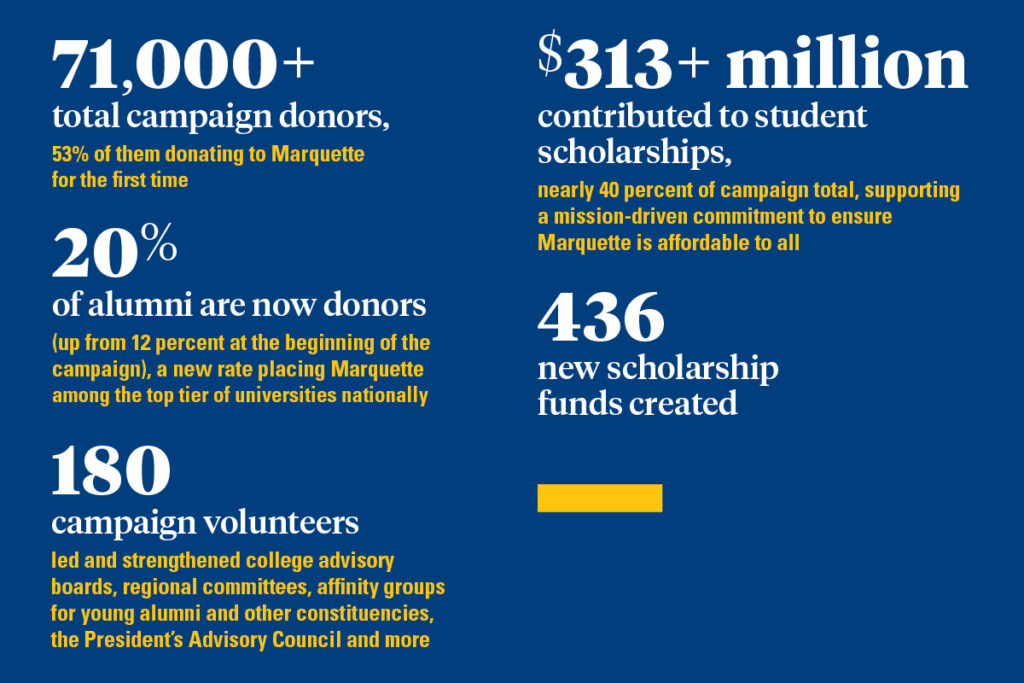
A new home 1,000 miles from home: student Justice Osondu
Living in Houston, Justice Osondu initially didn’t consider enrolling in a college a thousand miles away. Then his college readiness teacher, Dr. Loya, at Cristo Rey Jesuit College Prep put Marquette on his radar.

“She mentioned how it was a Jesuit school like Cristo Rey, had beautiful scenery because it was located downtown, and had strong academic programs that challenge you beyond your major to be equipped as a world changer in society,” he recalls. Finding out that Dwyane Wade, Hon Deg ’22, and fellow Houston-area native Jimmy Butler, Comm ’11, had degrees from Marquette didn’t hurt, either.
As his interest grew, the news that he’d be receiving one of the last two (out of an original 48) full-tuition scholarships for Marquette’s Urban Scholars program awarded that year “rocked my world,” he says.
Today, Osondu is a senior double-majoring in public relations and theology with a minor in peace studies. The Urban Scholars program sup- ports first-generation college students who show great academic promise. His involvement in the program has inspired Osondu to give back as a resident assistant and volunteer. “Marquette has helped me,” he says, “realize one of the quotes I live by now: ‘We’ve been blessed to be a blessing.’”
Supporting — and Endowing — Academic and Research Excellence

Endowed for impact: Dr. Brian Schmit
Dr. Brian Schmit, Eng ’88, Hammes Family Chair in the Marquette University and Medical College of Wisconsin Joint Department of Biomedical Engi- neering, is a specialist in biomechanics and neurorehabilitation, focusing on translating lab work into clinical applications to help individuals recover from injuries or manage degenerative conditions affecting mobility. An example is his $3.3 million National Institutes of Health-funded project to investigate how cardio training on novel equipment that creates unpredictable balance challenges improves walking in people with multiple sclerosis. He’s known for close partnerships with the MS community and others his research touches.
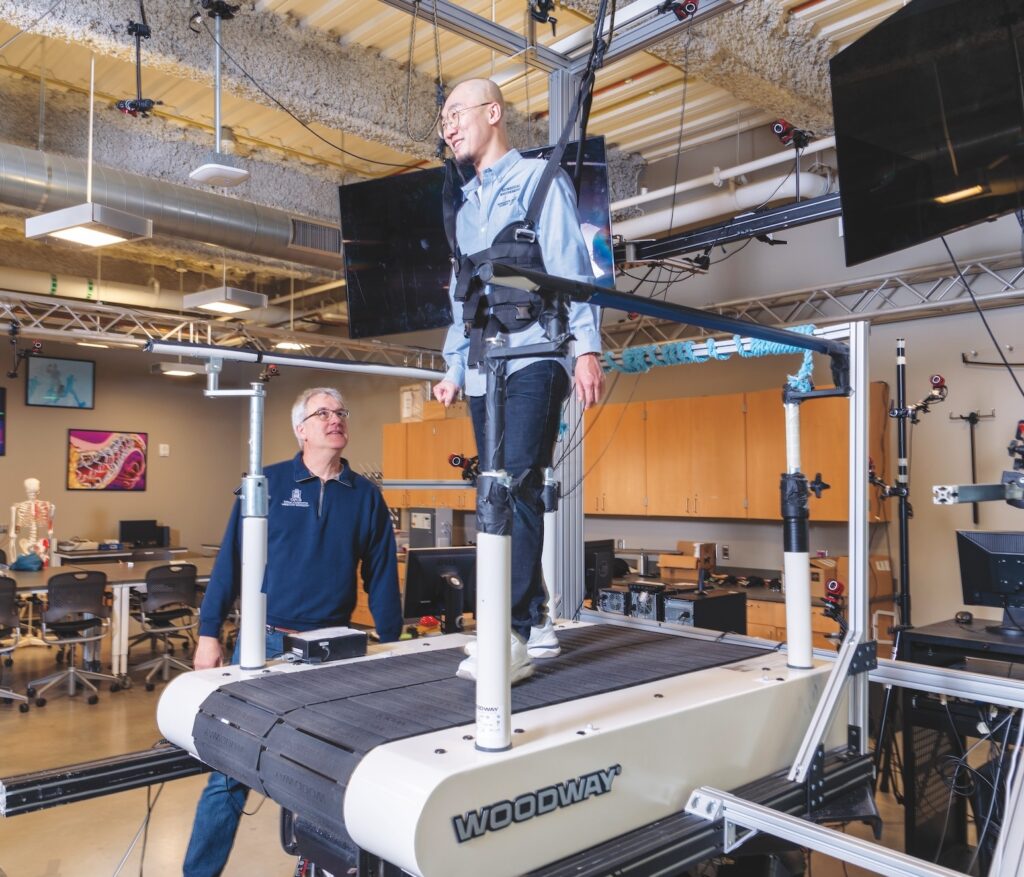
Made possible by a major gift from Jon and Ann Hammes, the Hammes Chair supports Schmit’s faculty excellence and extends his research reach. When fully vested, the chair’s endowment will provide $100,000 annually for needs such as student research positions in his lab, equipment renewals and much-valued flexibility to explore promising ideas outside the scope of existing grants.
Already, Schmit is developing a new device, inspired by therapists in the College of Health Sciences’ Neuro Recovery Clinic who take patients out to walk on the grass to practice balance and stability. Seeing the need for a year-round tool, he hired a team of undergraduates to design and build an indoor device that wobbles to simulate the uneven ground. “I’m really focused on trying to make a clinical impact right now to impact people’s lives directly,” Schmit says. “That’s why these new resources are so valuable — it takes resources with flexibility to be able to get these types of projects started.”
Centers Where Marquette’s Leadership Shines

Dr. Lisa Edwards: cultivating women’s leadership
Dr. Lisa Edwards, professor of counselor education and counseling psychology, has long impressed as a collaborative leader — a teacher, mentor, community partner and researcher focused compassionately on the mental health of Latinas who are pregnant or postpartum. Then, in January, she added a well-fitting role: director of Marquette’s Institute for Women’s Leadership, where she connects with partners in and around Marquette to advance gender-related research and promote leadership development among women.
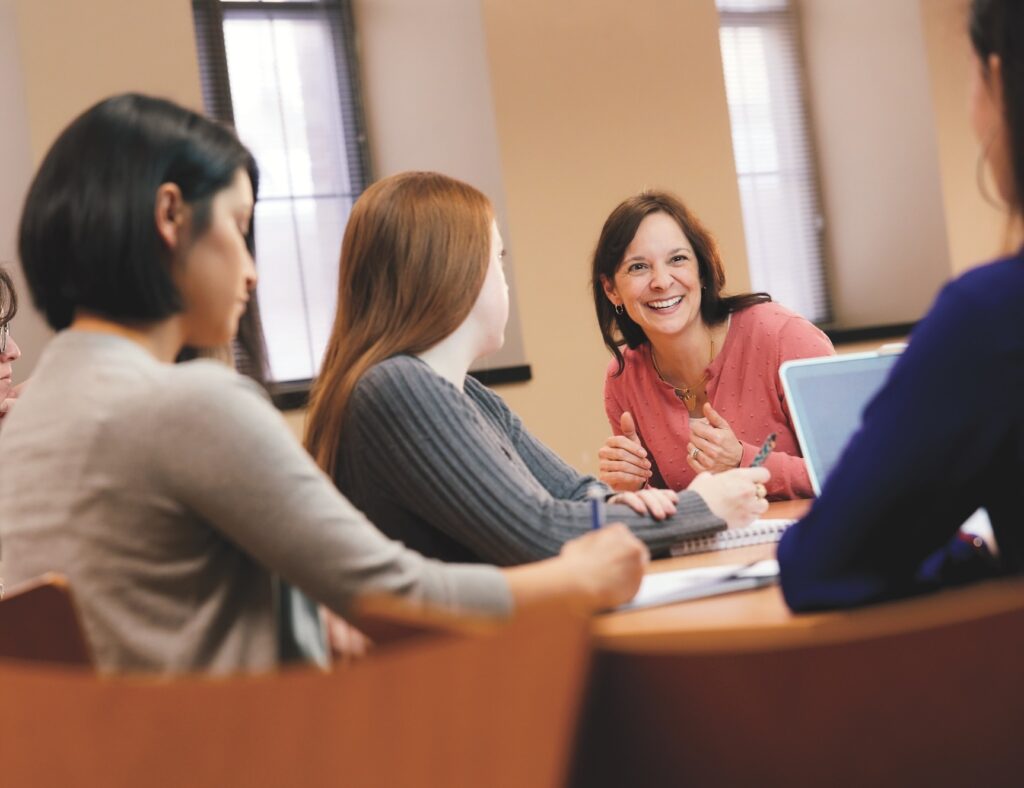
The faculty-run institute is a research incubator at its core. Three faculty fellows conduct projects each semester, last term bringing expertise from philosophy, counselor education and computer science. “It was so amazing working together as a research community,” recalls Edwards. “We found intersections in the research about giving voices to women whose voices aren’t typically heard.”
As a champion of community, Edwards appreciates the institute’s ample external engagement, including with local corporations. “We see the exciting gender work that’s being done at these organizations and companies — and where we need to continue to do work with leadership and gender,” she says.
This is the IWL fulfilling its promise. The spark for its creation came when donor Claire Rolfs, Arts ’73, noticed how few women were submitting funding proposals for innovative projects through Marquette’s Explorer Challenge. Rolfs partnered with Vice President for Research and Innovation Jeanne Hossenlopp to help launch the IWL in 2019 with a $5 million endowment from the Thomas J. Rolfs Family Foundation.
“I love this new role and am grateful for this opportunity,” Edwards says. “I’ve already met so many wonderful people who share the mission of IWL. It’s a bright light.”
A Campus Transformed to Serve Marquette’s Students and Mission
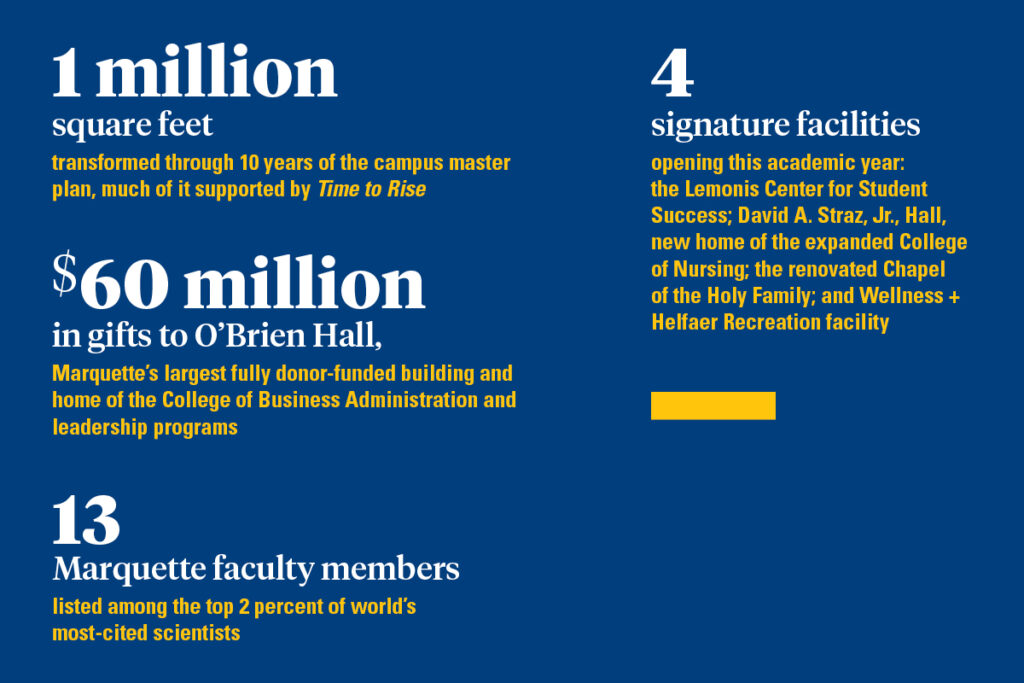
For the whole person: a trailblazing recreation and wellness facility
When it opens in January, the Wellness + Helfaer Recreation facility is destined to become a star of Marquette’s student-led campus tours. That will be understandable for a project that has reimagined and expanded the existing Helfaer Recreation Center, giving it a stunning, naturally lit atrium and inviting spaces accommodating a full range of sports and workouts. But just as important will be the message prospective — and current — students receive about the building as a welcoming place to tend to their mental health and wellness needs.

The idea of integrating renewed recreation facilities under one roof with complementary services that had been scattered not so invitingly across campus — the Marquette University Medical Clinic, the Counseling Center, alcohol and drug recovery programs, and sexual violence prevention resources — was a key part of Marquette’s campus master plan. It was also central to the vision of Lovell, an accomplished marathoner and triathlete who often ran with members of the Marquette community and who was open about his own exposure to childhood traumas and his subsequent mental wellness journey. “It will eliminate any stigma for anyone walking in the facility no matter what services they need,” he said in announcing the project in 2022. “When you think about the future of wellness on campus, we want to be state of the art.”
Thanks to $25 million in donor support, that 180,000-square-foot vision will soon be making a daily difference in students’ lives. And thanks in particular to nearly $8 million raised through a Board of Trustees-led effort to honor Mike and Amy Lovell for their leadership in addressing mental health in Milwaukee, the third and fourth floors of the facility’s new tower will be known as the LOVELLSTRONG Center for Student Well-Being, a stirring reminder of the Lovells’ compassionate legacy.
